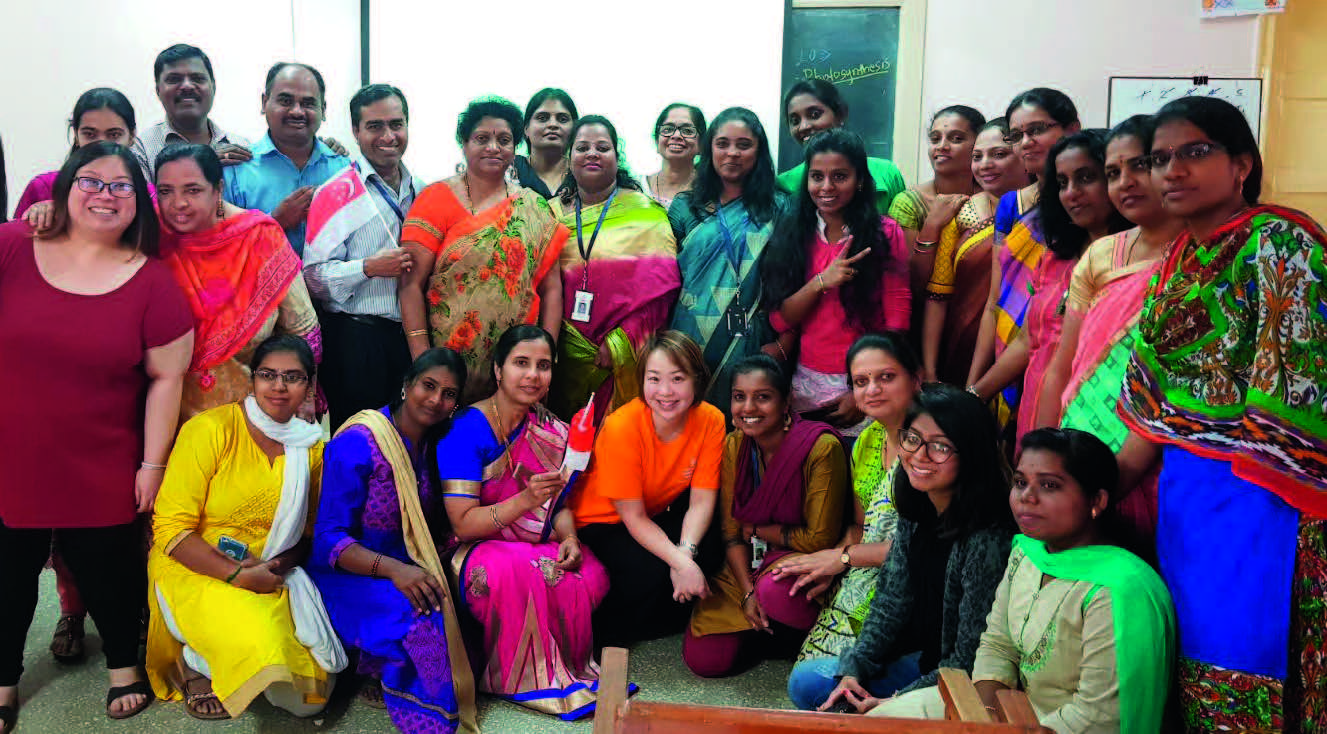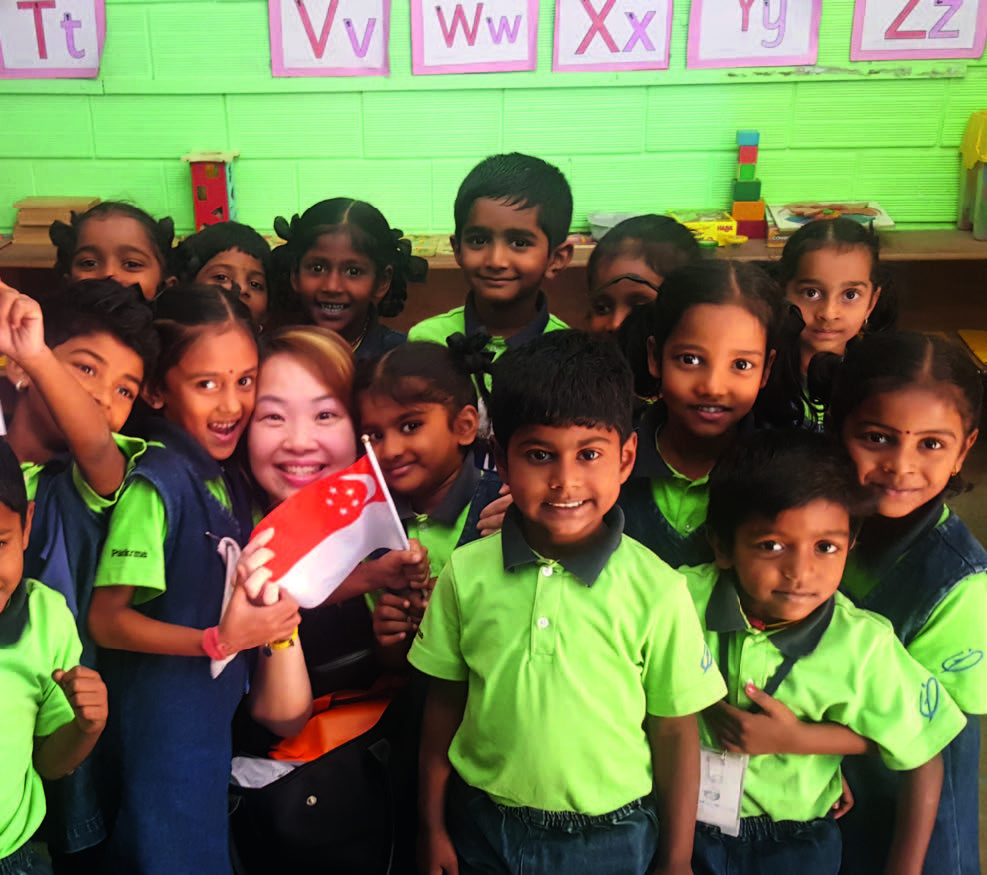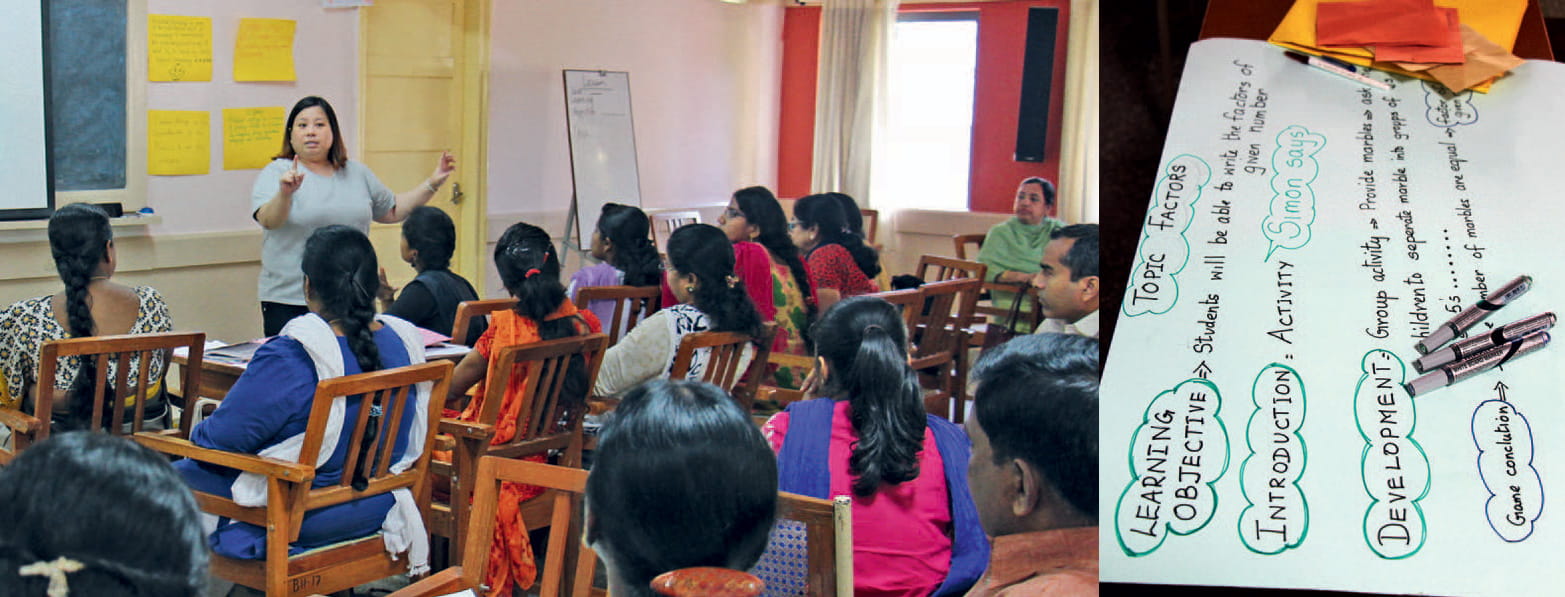Stories > The Right to Learn
The Right to Learn
Educators from Singapore and India are collaborating to enhance the quality of education in Karnataka.
BY RACHEL CHAN
n parts of Asia, disparity within the education system is an ongoing topic of debate. Issues faced include a lack of quality education at public schools, as compared to private institutions that many from the lower income bracket are unable to afford.
For the south-western Indian state of Karnataka, this may come as a surprise, considering that the state has been slated to become a hub for higher education. In fact, Mumbai newspaper The Indian Express reported that the number of higher education institutions in the region has increased three-fold in the last 10 years.

Mathematics and Science teachers from Karnataka with SIF specialist volunteers, including team leader Peggy Foo (front row, fourth from left).
At an education festival held in Raichur in January, S.G. Siddaramaiah, chairman of Kannada Development Authority noted that most private institutions demanded large sums of money, causing a burden on those from lower and middle income households. He added that more work was needed to enhance the quality of education provided at local public schools.
The Karnataka state government too, has announced its commitment to the larger UN Sustainable Development Goal of ensuring inclusive and quality education for all. Specifically, it has pledged to substantially increase the supply of qualified teachers by 2030, including through international cooperation to help train teachers.
LASTING SOCIAL IMPACT
With the wheels set in motion, the Singapore International Foundation (SIF) launched a Mathematics & Science Curriculum Enhancement Project last December, to provide specialist training to teachers in Karnataka. The ongoing project is centred on a three-year partnership with Parikrma Humanity Foundation, a Bangalore-based non-profit organisation aimed at providing quality education and support to children from orphanages and slums across the city.
A team of Singapore International Volunteers will leverage their teaching experience to equip Mathematics and Science educators from the Indian state with skills to facilitate interactive learning classes.
“The Teachers From Karnataka Were Assertive And Eager To Both Ask And Answer Questions Posed To Them... It Was Inspiring To See These Educators Overcome Their Constraints Despite Having Limited Resources.”
Peggy Foo, SIF Specialist Volunteer
“Though one can acquire cerebral skills of Mathematics and Science easily, the teaching of the concepts and the methodologies are very, very important,” shares Mr P.G.R. Sindhia, the former Minister for Home, Transport & Finance with the Government of Karnataka.

Peggy Foo with local students who benefi tted from the programme.
“At the primary school level, it is essential that these learnings go to the hearts of the boys and girls. The teachers’ skills, when enhanced and modernised, would benefit these children.”
Indeed, the project aims to create a positive social impact in Karnataka’s education sector by equipping 415 Indian educators over the course of three years with the expertise to teach 5,250 school-going children annually.
DEVISING NEW LEARNING METHODS
Leading this teaching project is SIF specialist volunteer Peggy Foo. The National Institute of Early Childhood and Development lecturer is no stranger to capacity building work, having led SIF on a similar project in Thailand six years ago.
Motivated by a desire to share how Mathematics and Science can be taught as a problem-solving skill in fun and engaging ways, she decided to embark on the project in Karnataka.
But guiding a diverse group of Indian educators – who did not undergo a standard form of training – was tricky. “We therefore designed an all-encompassing course that could help strengthen them in terms of both content and pedagogy,” she explains. The latter is a body of knowledge and learning theories on how children learn Mathematics and Science, as well as the implications for effective classroom practices.
“I had them play the roles of learners, so that they could experience the processes that they would eventually have to take their own students through,” shares Foo. The specialist volunteers also demonstrated learning methods that veered from a traditional set-up of lectures to interactive group activities to facilitate better student-teacher engagement.
Initially unsure of how the participants would respond to the training, Foo was encouraged by their enthusiasm.
“The teachers from Karnataka were assertive and eager to both ask and answer questions posed to them. Thus, I divided them into groups, so that everyone got an opportunity to be heard.”
There is certainly no denying their resilience and commitment. “It was inspiring to see these educators overcome their constraints despite having limited resources. They even went so far as to create their own teaching materials, which ate into their own pockets and time,” says Foo.
She was also impressed by how bilingual participants helped to translate the lessons to their counterparts who were not well-versed in English, so no one got left behind. Beyond this, witnessing the participants’ devotion to their work and family was a humbling experience for Foo. “On training days, several teachers shared that they woke up in the early hours to cook for the whole family, before making their way to the training venue. Yet, they remained highly engaged and participative throughout the day,” she adds.

Besides having a positive impact on the schoolchildren, the collaborative effort between Singapore and India will nurture a pool of highly trained educators.
Outside the classroom, the Singaporean and Indian educators swiftly connected with one another. “One of our volunteers wanted to try on a saree. She was touched by the warmth of the Indian counterparts, who went shopping with her for the traditional garment, and even taught her the correct way of wearing it,” she shares.
EMPOWERMENT THROUGH KNOWLEDGE
Foo is confident that boosting the capabilities of Karnataka’s teachers can directly help with educational reforms. Her first-hand involvement in such projects has further convinced her that teachers must be adequately trained to bring about any significant change at the classroom level.
Echoing her views was Shukla Bose, the founder of Parikrma Humanity Foundation. “Singapore’s education system has been globally recognised, and we are excited to work together with SIF to raise the teaching standards of our Mathematics and Science teachers to support children’s learning at the primary school level,” she says. “This collaborative effort will not only impact the children, but will also serve to nurture a pool of highly trained educators who can go on to share their acquired knowledge and skills in this sector.”
Aimed at building long-term capacity in the region’s education sector, the project doesn’t stop with training of school teachers. A public education camp will be held for parents, to share strategies on helping their children learn these subjects in a fun manner at home.
Additionally, a select group of master trainers from Karnataka will be identified to train other Mathematics and Science educators, who will, in turn, conduct cascade training at their respective schools.
These educators will attend special workshops, receive online mentoring sessions and participate in a study visit to Singapore. Here, they will get to see the best practices shared being applied in the Singaporean context, thus guiding them in applying or adapting them for their own schools.
